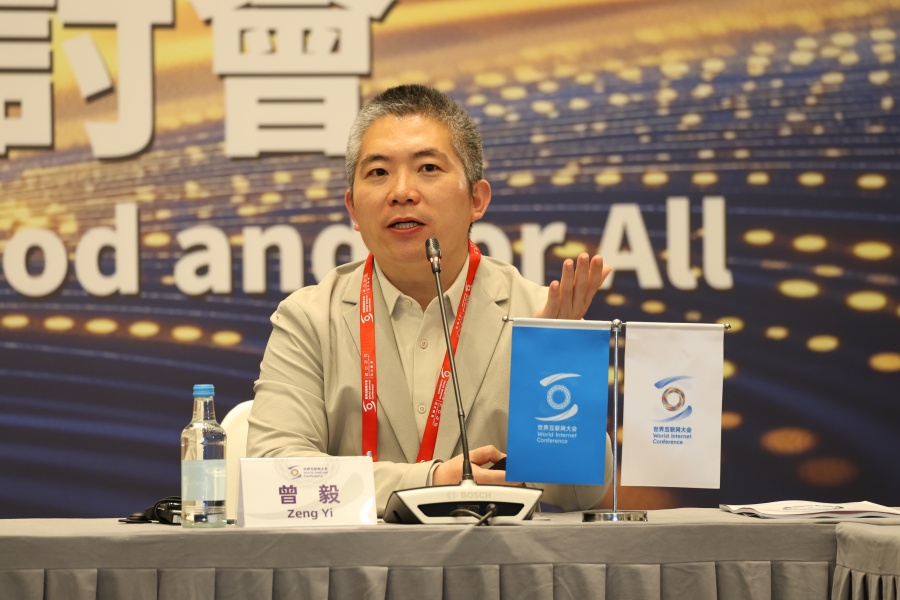
- Home
- Media Center
-
Events
- Wuzhen Summit
- Regional Forums
- Practice Cases of Jointly Building a Community with a Shared Future in Cyberspace
- World Internet Conference Awards for Pioneering Science and Technology
- The Light of Internet Expo
- Straight to Wuzhen Competition
- Global Youth Leadership Program
- WIC Distinguished Contribution Award
- Membership
- Research & Cooperation
- Digital Academy
-
Reports
- Collection of cases on Jointly Building a Community with a Shared Future in Cyberspace
- Collection of Shortlisted Achievements of World Internet Conference Awards for Pioneering Science and Technology
- Reports on Artificial Intelligence
- Reports on Cross—Border E—Commerce
- Reports on Data
- Outcomes of Think Tank Cooperation Program
- Series on Sovereignty in Cyberspace Theory and Practice
- Other Achievements
- About WIC
- 中文 | EN

Workshop on AI Governance and Sustainable Development: for Good and for All|Zeng Yi: AI empowers achievement of UN SDGs

Zeng Yi, co-chair and co-lead of the AI Safety and Governance Program of the World Internet Conference (WIC) Specialized Committee on AI, and professor at the Institute of Automation of Chinese Academy of Sciences, speaks at the "AI Governance and Sustainable Development: for Good and for All" Workshop during the WIC Asia-Pacific Summit in Hong Kong on April 14. [Photo/wicinternet.org]
Zeng Yi, professor at the Chinese Academy of Sciences' Institute of Automation, called for the establishment of a multi-party collaboration mechanism to promote the balanced achievement of the 17 United Nations Sustainable Development Goals (SDGs) through the application of artificial intelligence (AI) technologies.
Zeng made these remarks at the Workshop on AI Governance and Sustainable Development: for Good and for All, which was held during the World Internet Conference (WIC) Asia-Pacific Summit in Hong Kong on April 14.
Zeng, also co-chair and co-lead of the AI Safety and Governance Program of the WIC Specialized Committee on AI, said that the current progress in achieving the UN SDGs exhibits significant disparities, with areas such as biodiversity conservation and cultural heritage inheritance lagging behind in comparison to targets such as hunger eradication and health improvement. According to Zeng, long-term and public welfare goals require government-led implementation, while goals offering shorter-term benefits can be attained through active participation of the corporate sector, thereby complementing each other.
In terms of technological application, Zeng highlighted biodiversity conservation as an example, demonstrating a species’ coexistence panorama constructed through technological means. Through visual analysis, the complex ecological connections between humans and tiny organisms like ants become clear, confirming the integrity of ecosystems to a considerable extent.
Zeng also presented a project developed by his team, utilizing AI-powered digital mapping of global cultural heritage sites, to showcase the use of AI in cultural heritage preservation. For instance, the application compares the evolutionary relationships and distinctions between Zhoukoudian’s Peking Man fossils in Beijing and fossils in South Africa, while also exploring the architectural parallels and differences between China's bell and drum towers and Western pagodas. The analyses of the application revealed profound links between different civilizations.
"AI capacity building can drive global sustainable development and should not be solely limited to infrastructure development and data processing. We also need to build a solid foundation for AI security governance," said Zeng, noting wide gaps among various countries and regions globally in terms of AI security framework. "Strengthening these capacities is essential in order to achieve sustainable development," he added, calling for international cooperation in constructing a global AI governance framework that coordinates development and security.

The World Internet Conference (WIC) was established as an international organization on July 12, 2022, headquartered in Beijing, China. It was jointly initiated by Global System for Mobile Communication Association (GSMA), National Computer Network Emergency Response Technical Team/Coordination Center of China (CNCERT), China Internet Network Information Center (CNNIC), Alibaba Group, Tencent, and Zhijiang Lab.





